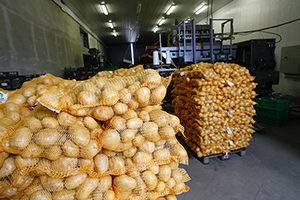Mar 28, 2018Trade, politics rundown
World and national affairs make their way into potato fields
Events have been moving fast on Capitol Hill, and those fast-paced developments could affect potato growers. The National Potato Council has been sending regular updates on its view of some of these events.
So far, new Chinese tariffs leave out potatoes
On Thursday, March 22, President Trump announced $60 billion worth of tariffs on Chinese imports to the U.S. Overall, the proposed list of tariffs amounts to approximately 1,300 different products and is in response to China’s intellectual property practices.
“We have a tremendous intellectual property theft problem,” Trump told CNN. “It’s going to make us a much stronger, much richer nation.”
The action drew an immediate response from Beijing as they released a retaliation list on March 23 that included U.S. fruit, nuts and wine, but not potatoes.
“At this point, U.S. potato products are not included but given our experience with tariff retaliation in the Mexican trucking dispute, we are certainly remaining vigilant as this process develops,” said John Keeling, National Potato Council CEO.
Farm Bill stalls over SNAP funding
As Congress headed into its two-week Easter recess (until April 6), the 2018 Farm Bill process became stalled in the House over the level of funding for the Supplemental Nutrition Assistance Program (SNAP) or food stamp program. Committee Democrats are objecting to any further negotiations with the majority Republicans.
The delay in rewriting the Farm Bill may have serious consequences. “Currently there are 37 programs that will stop functioning on October 1 if Congress doesn’t rewrite the bill in some form. Among those is the Technical Assistance for Specialty Crops program that has been so beneficial for the potato industry,” said Kam Quarles, vice president. of public policy for NPC.
Potato DC Fly-In attracts strong attendance and speakers
Electronic logging devices (ELDs), immigration reform, trade agreements, the Farm Bill, pollinator health, regulatory reform at the EPA and funding for potato research programs are hot button items in the potato world. All these legislative topics and more were on the table during the National Potato Council’s 2018 Potato D.C. Fly-In.
More than 125 potato growers, friends of the potato industry and the 20 members of the Potato Industry Leadership Institute (PILI) class came to Washington, D.C. Feb. 26-March 1 to advocate for the nation’s potato industry.
The event began Monday afternoon with a presentation on agriculture immigration reform by Chuck Conner of the National Council of Farmer Cooperatives and on regulatory reform by Jeff Sands of the Environmental Protection Agency.
Monday evening, Ambassador Arturo Sarukhan, former Mexican ambassador to the United States, spoke on the tenuous relationship between the U.S. and Mexico. Sarukhan observed that Mexico is home to the largest U.S. expatriate community in the world. He noted that through NAFTA Mexico, Canada and the U.S. are exporting North American goods through joint supply chains and platforms and their economies are more intertwined and integrated since NAFTA and 9/11.
“Mexico buys more U.S. exports than China and Japan combined or all of Latin America and Central America,” Sarukhan said. “Mexico is the number one trade partner in 25 states.” Sarukhan said that changes to NAFTA would have come if the U.S. had stayed in the Trans-Pacific Partnership.
Tuesday morning saw a constant stream of speakers giving up-to-date analysis on current issues including the Endangered Species Act, ELD and trucking issues, Trump administration trade policies and prospects for the 2018 Farm Bill.
Randy Russell of the Russell Group interviewed DaNita Murray, chief counsel for the Senate Agriculture, Nutrition and Forestry Committee, on the process for writing the 2018 Farm Bill. Russell said that passage will be a challenge and will require bipartisan cooperation among ag producing states and the more urban states.
Probably the biggest stumbling block in the Farm Bill is SNAP, Russell said. “The Farm Bill is really a nutrition bill,” Russell said. “SNAP represents 80 percent of the Farm Bill budget.”
Following lunch, Amy Walter, national editor of the Cook Political Report, spoke on the political outlook for 2018. Walter, a regular guest on political commentary shows such as “Fox News Sunday” and “Meet the Press,” spoke about the continued bad blood and lack of civility between Democrats and Republicans in Congress resulting in lack of any bipartisan legislative accomplishments in the House or Senate.
The 2019 Fly-In will be at the Capital Hilton from Feb. 25-28.







